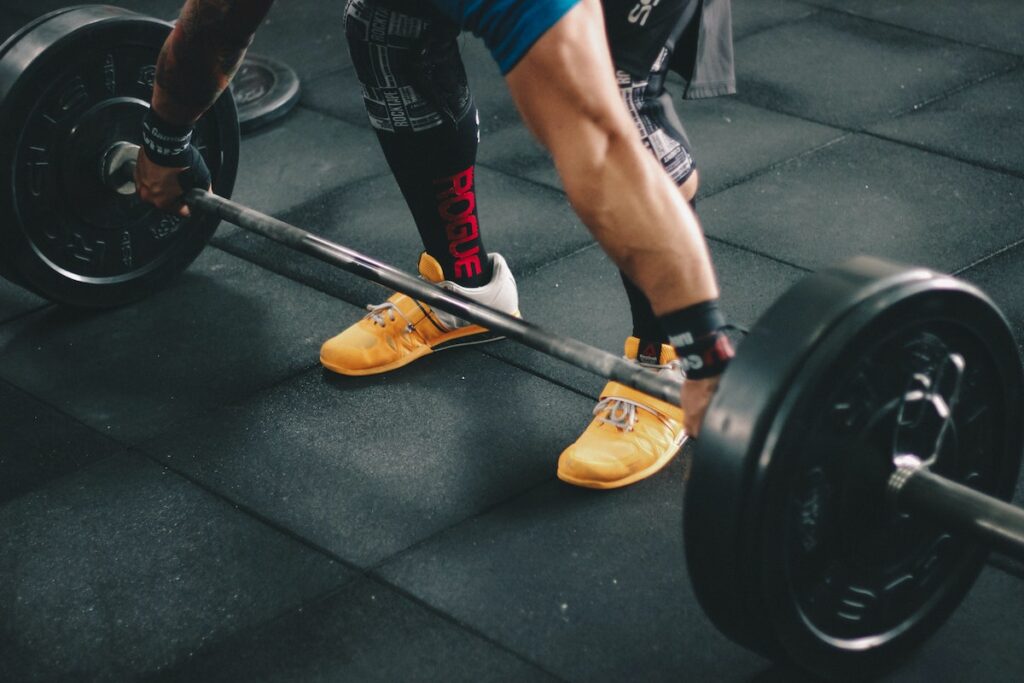If you’re on a fitness journey, you’ve likely questioned whether a calorie deficit affects muscle building. While cutting calories for weight loss is common, building muscle typically requires a higher caloric intake. In this post, we’ll explore this paradox, discussing the role of calories in muscle growth and the impact of a calorie deficit.
In this article
- What is a calorie deficit and how does it affect weight loss?
- Can you build muscle in a calorie deficit?
- How does a calorie deficit impact muscle growth?
- Do you need to be in a caloric surplus for muscle growth?
- Does calorie deficit hinder muscle building? How?
- What foods should you eat to build muscle in a calorie deficit?
- Frequently asked questions (FAQ)
- Final Word

We’ll also explore strategies for building muscle while in a calorie deficit, such as optimizing protein intake and incorporating resistance training. Challenge the ‘calories in, muscles out’ notion and gain insights into fitness nutrition.
Can you build muscle on a calorie deficit? It’s not a simple yes or no answer. While a calorie deficit can make muscle building more challenging due to less energy and fewer nutrients for muscle recovery, it’s still possible with the right balance of protein intake, resistance training, and careful nutritional planning.
What is a calorie deficit and how does it affect weight loss?
A calorie deficit occurs when you consume fewer calories than your body requires for daily activities and functions. It creates an energy imbalance, forcing your body to tap into stored energy (such as fat) to make up for the shortfall.
This deficit is associated with weight loss because when your body burns more calories than you consume, it turns to stored fat for energy, resulting in a reduction in body weight.
By consistently maintaining a calorie deficit, your body will continue to rely on stored energy sources, leading to sustained weight loss over time. However, it’s important to create a moderate calorie deficit to avoid potential negative effects on metabolism, muscle mass, and overall health.
Can you build muscle in a calorie deficit?
Yes, it is possible to gain muscle while in a caloric deficit, but it can be more challenging compared to when you’re in a caloric surplus, and here’s why.
Let’s first understand the process of muscle growth or hypertrophy. Hypertrophy requires a stimulus and the right surroundings or resources. The stimulus often comes from resistance training or weight lifting, which stresses your muscles.
This type of exercise results in minuscule damage to your muscle fibers, initiating a repair procedure known as muscle protein synthesis. Here, the injured fibers are restored and made more robust. To facilitate muscle protein synthesis – the second part of the process – your muscles require an appropriate environment or resources.

These conditions are fulfilled by supplying your body with protein, which can then be split into amino acids to reinforce the muscle fibers, known as myofibrils. Growth or increased muscle size due to hypertrophy is a result of a rise in the thickness of these myofibrils.
Essentially, hypertrophy comes from an enhancement of the thickness of existing muscle fibers. Muscle breakdown and muscle protein synthesis are continuous processes. However, muscle growth only takes place when muscle protein synthesis surpasses muscle breakdown.
For muscle protein synthesis and repair to happen, the body needs energy or calories, and ‘building blocks’ or amino acids derived from protein.
How does a calorie deficit impact muscle growth?
Two potential issues arise with a calorie deficit that could negatively impact muscle growth:
First, as we’ve identified, the muscle-building process of muscle protein synthesis requires energy. If your caloric intake is insufficient, this process is hindered.
Furthermore, all bodily functions, including basal metabolic rates functions like breathing and circulation, and physical activity and exercise, need energy. Your body typically uses stored body fat and glycogen (stored carbs) as the main energy sources, the utilization of which depends on your activity level.
Protein provides energy during intense exercise, but it only accounts for about 10% of the total energy. However, in a state of fasting or a calorie deficit, the body uses a greater percentage of protein, leading to more muscle breakdown to meet your energy requirements.
We do not have storage for protein aside from muscle tissue. Thus, when the body uses protein for energy, muscle breakdown occurs and hinders muscle growth.
Do you need to be in a caloric surplus for muscle growth?
Most evidence indicates that a caloric surplus is necessary for muscle growth. However, it’s crucial to note that the body does not experience caloric surplus or deficit in 24-hour cycles as we commonly think.
Rather, it experiences it on a minute-to-minute basis. Immediately after eating, your body is in a state of caloric surplus due to the sudden influx of energy and nutrients. Conversely, after a while without eating (like when you wake up), you’re in a relative caloric deficit.
This cycle repeats throughout the day based on your calorie intake and frequency of meals. By the end of the day, you could be in a net caloric deficit (having burned more calories than consumed) or a net caloric surplus (having consumed more calories than burned).
But since the body operates on a more immediate timeframe concerning resource availability, you can build muscle even while in a caloric deficit. What you need is to make sure that you have enough energy, protein, and carbohydrates during and after workouts for muscle protein synthesis to occur.
Does calorie deficit hinder muscle building? How?
A calorie deficit can potentially hinder muscle building to some extent. When you’re in a calorie deficit, your body is receiving fewer calories than it needs to maintain its current weight and support daily activities. This deficit of energy can impact muscle building in several ways:
- Limited fuel for workouts: A calorie deficit can reduce the available energy for intense workouts, leading to decreased training performance and potential muscle fatigue.
- Insufficient nutrients: In a calorie deficit, it becomes challenging to consume an adequate amount of macronutrients (such as protein) and micronutrients (vitamins and minerals) that are essential for muscle repair, recovery, and growth.
- Increased muscle protein breakdown: When your body is in a calorie deficit, it may start breaking down muscle protein as a source of energy. This can result in muscle loss rather than muscle growth.
- Slower recovery: Insufficient calories can delay the recovery process after workouts, limiting the body’s ability to repair damaged muscle tissues and adapt to training stimuli.
While it’s possible to make some progress in building muscle while in a calorie deficit, the rate of muscle growth may be slower compared to when in a calorie surplus. To mitigate the negative effects, it’s important to prioritize protein intake, engage in resistance training, and carefully manage the extent and duration of the calorie deficit.
What foods should you eat to build muscle in a calorie deficit?
When aiming to build muscle in a calorie deficit, it’s important to consume foods that are nutrient-dense and provide sufficient protein to support muscle growth. Here are some foods you should consider including in your diet:

- Lean protein sources: Chicken breast, turkey breast, lean cuts of beef, fish (such as salmon, tuna, and tilapia), eggs, low-fat dairy products (Greek yogurt, cottage cheese), tofu, and legumes (beans, lentils) are excellent sources of protein.
- Vegetables: Include a variety of vegetables in your diet for essential vitamins, minerals, and fiber. Examples include broccoli, spinach, kale, peppers, carrots, and cauliflower.
- Whole grains: Opt for complex carbohydrates that provide sustained energy. Whole grains like quinoa, brown rice, oats, and whole wheat bread should be included in moderate amounts to meet your carbohydrate needs.
- Healthy Fats: While you’re in a calorie deficit, it’s important to include healthy fats for overall health and hormone regulation. Good sources include avocados, nuts and seeds (almonds, walnuts, chia seeds, flaxseeds), olive oil, and fatty fish like salmon.
- Fruits: Incorporate a variety of fruits for essential vitamins, minerals, and antioxidants. Berries, apples, oranges, bananas, and grapes are great choices.
- Dairy or plant-based alternatives: Choose low-fat dairy products or plant-based alternatives like almond milk, soy milk, or coconut milk to meet your calcium and vitamin D needs.
Frequently asked questions (FAQ)
Got more questions about Does Calorie Deficit Hinder Muscle Building? Check out some commonly asked questions about this topic below.
What type of workouts should I do to build muscle in a calorie deficit?
To build muscle in a calorie deficit, focus on resistance or strength training workouts. These can include weightlifting, bodyweight exercises, or workouts using resistance bands. The goal is to stimulate muscle fibers to grow even when the body is in an energy-saving mode due to the calorie deficit.
How can I speed up muscle recovery while in a calorie deficit?
Accelerating muscle recovery while in a calorie deficit can be facilitated by ensuring adequate protein intake, as protein is the building block of muscles and aids in their repair and growth. Hydration is equally important for muscle recovery, so make sure you’re drinking enough water throughout the day. Moreover, getting enough rest and quality sleep will allow your muscles to recover and grow more.
Can I gain muscle while in a calorie deficit without supplements?
Yes, you can gain muscle while in a calorie deficit without using supplements. Supplements can aid the process but they are not necessary. Prioritize a diet rich in high-quality proteins (like lean meats, fish, eggs, or plant-based proteins if you’re vegetarian or vegan), along with plenty of fruits, vegetables, and whole grains for a balance of nutrients.
Final Word
Have you grasped the idea that a calorie deficit doesn’t have to obstruct your muscle-building journey? It’s true, it may present a challenge, but with the right diet and workout strategies, it’s entirely attainable. So, what changes are you planning to make in your fitness routine based on what you’ve learned today?
This guide illuminates your unique fitness journey. There’s no single path. You’ll get the results you want by adapting these tips. Share this guide with a friend if it was helpful. Check out my other fitness and nutrition posts. Let’s progress together in health and fitness.
